[[{“value”:”
Outside of two heroes that pushed down the overall indices, there isn’t anything benign about this PCE inflation data.
By Wolf Richter for WOLF STREET.
The PCE price index, released today by the Bureau of Economic Analysis, was benign. The overall PCE price index and the core PCE price index barely ticked up on a month-to-month basis, and on a year-over-year basis decelerated further toward the Fed’s 2% target. And that’s nice. But why? And the answer is not nice.
Two very unusual things happened – one has never to that extent happened before in the data going back to 1960, and the other hasn’t happened to that extent since the market crash in 2020 – which pushed down the core services PCE price index, the core PCE price index, and the overall PCE price index.
What’s not nice is that we know that those two components will snap back violently.
The PCE (Personal Consumption Expenditure) price index tracks not only goods and services that are included in the CPI (Consumer Price Index), but also other categories that consumers don’t pay for directly, such as many financial services, and it tracks many of the components not by observing transaction prices, but by “imputing” price levels from other data, including from financial markets.
This PCE price index for “financial services” with its “imputed” prices that consumers don’t pay for directly was one of the two stars of the show today.
The “financial services” PCE price index, which features heavily in core services, plunged month-to-month by 1.69% (-18.6% annualized) in April, by far the biggest drop since April 2020, when it plunged even more based on the values it imputed from the crash of the financial markets at the time.
April 2025 experienced a big stock market sell-off, a five-day drop totaling 12.4% of the Wilshire 5000 index, though markets recovered afterwards. And the PCE price index with its imputed values went haywire – but we know that it won’t last, that it will snap back violently:
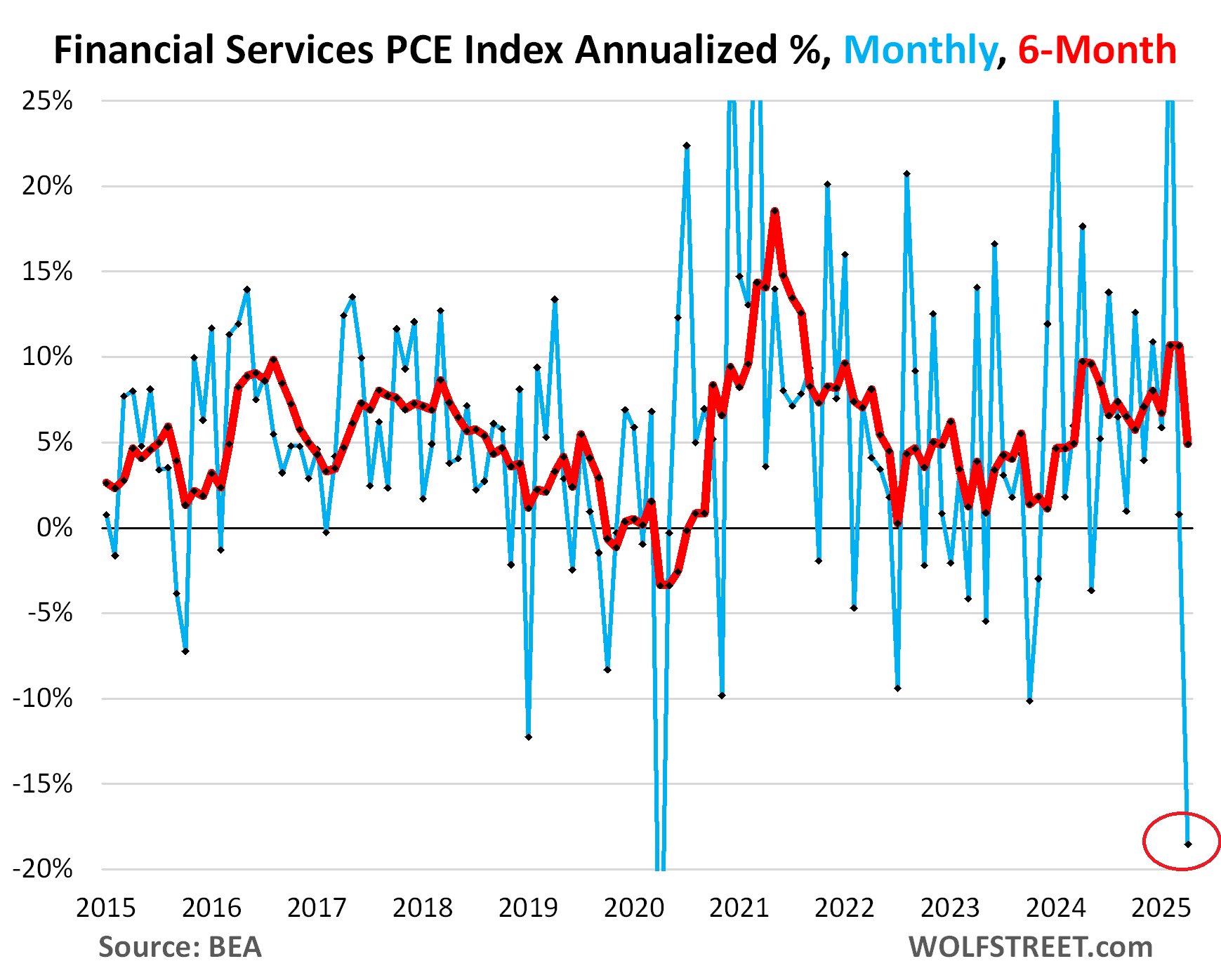
These are financial services many of which consumers don’t pay for directly, and much of it is imputed from other data. “For example, the imputed value of banking services to deposit holders is calculated based on factors like interest rates and the volume of deposits,” explains the BEA.
It includes “financial services furnished without payments” for which imputed values are used; it includes services provided by pension plans; commercial banks and credit unions; regulated investment companies; portfolio management and investment advice firms; trust, fiduciary, and custody activities, etc.
Some of the sources from which values are imputed are FDIC data, PPI data, data from stock exchanges, other government data, etc.
And this financial services PCE price index is hugely volatile, some of it related to sharp movements in the financial markets, as in April 2020 and in April 2025. And it will snap back.
The Fed knows all this, and Powell has occasionally mentioned the Financial Services component when it acts up in one or the other direction, and he might mention it again.
Another hero: Recreation Services PCE price index plunged month-to-month by 0.73% (-8.4% annualized), the biggest plunge in the entire history of the data going back to 1960. So this was another huge outlier.
And we know it too will snap back, by just looking at this crazy chart of month-to-month changes:
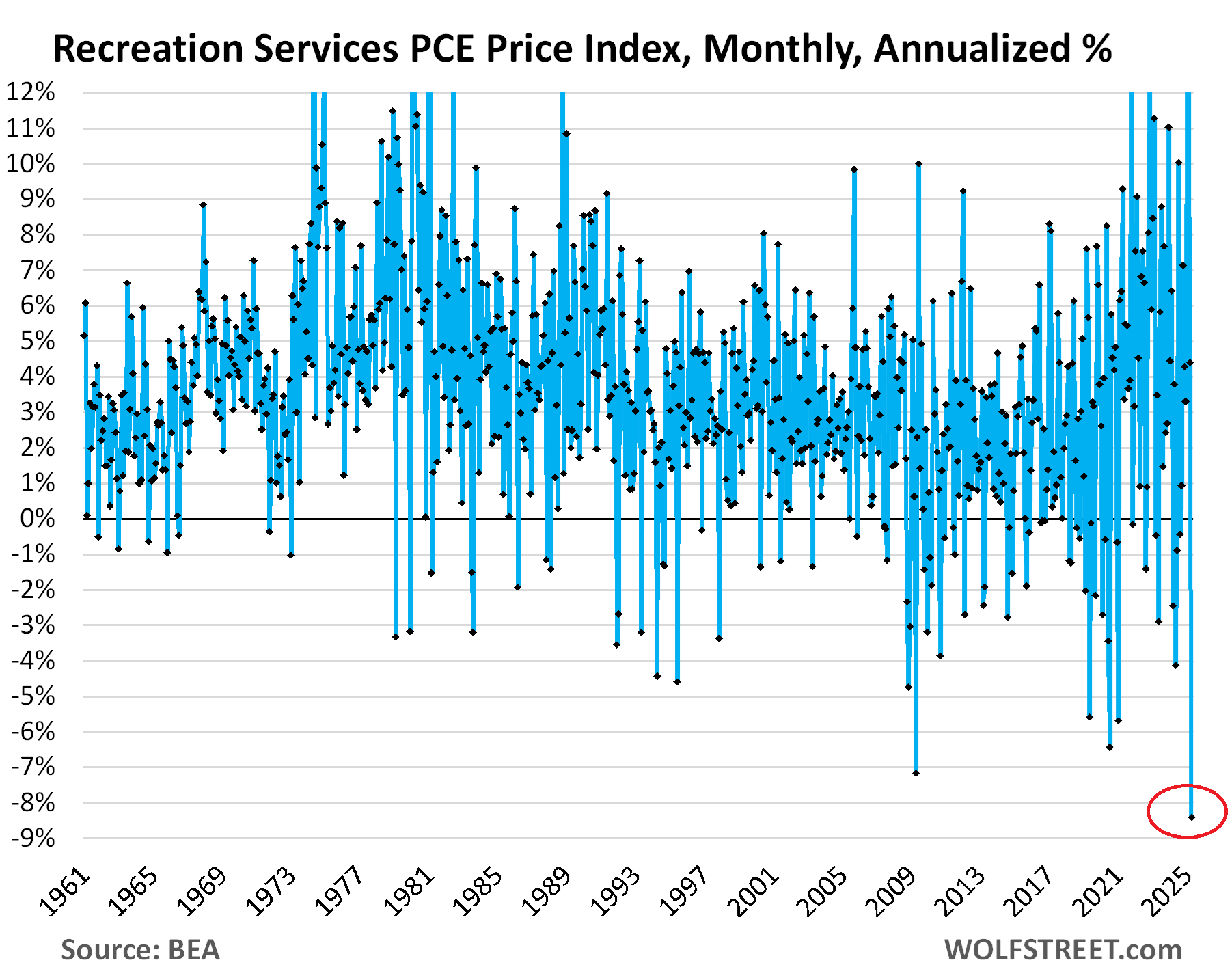
The Core Services PCE price index was pushed down substantially by these two heroes – Financial Services and Recreation Services: It rose by only 0.06% (+0.77% annualized) month-to-month in April, the smallest increase since April 2020, when, you guessed it, it had been pushed down even further by the Financial Services index due to the turmoil in the financial market at the time.
However, the remaining core services categories showed significant inflation, except for “Other services.” Month-to-month annualized:
- Housing: +4.3% second highest since October
- Health care: +4.0%
- Transportation services: +9.3%
- Food services: +4.3%
- Insurance: +3.3%
- Non-energy utilities: +3.5%
- Other services: -0.8%
So outside of those two heroes, there isn’t anything benign about this inflation data. And it will snap back too because financial services and recreation services will snap back.
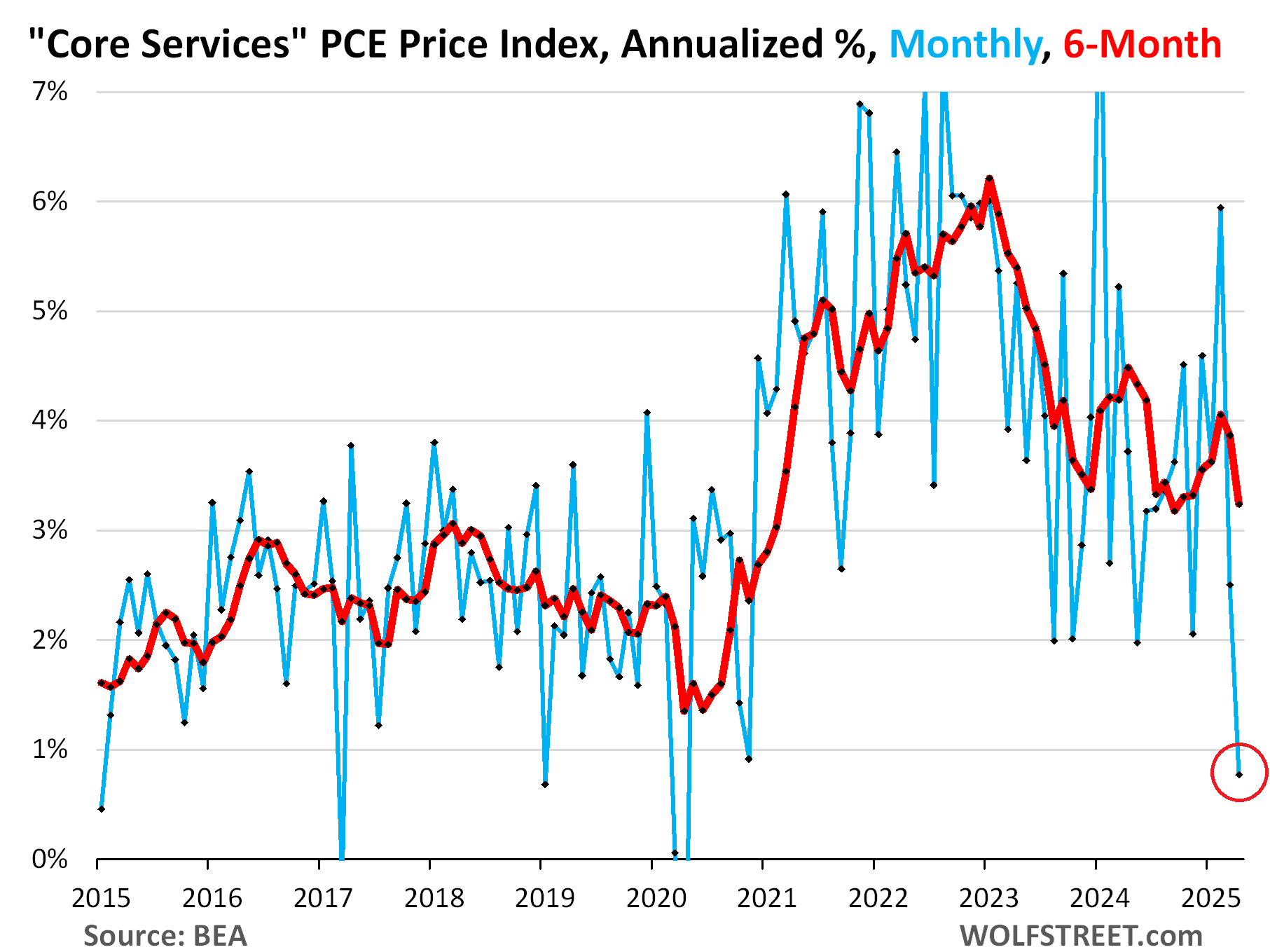
The “market-based PCE price index” was not benign. The BEA also produces an alternative “market based” PCE price index that excludes most imputed data (except owners’ equivalent of rent); and importantly, it excludes imputed components of financial services. It includes only prices that are based on actual transactions.
This market-based services PCE price index increased month-to-month by 3.3% annualized, a slight deceleration from the prior month; and it increased year-over-year by 3.2%, a slight acceleration.
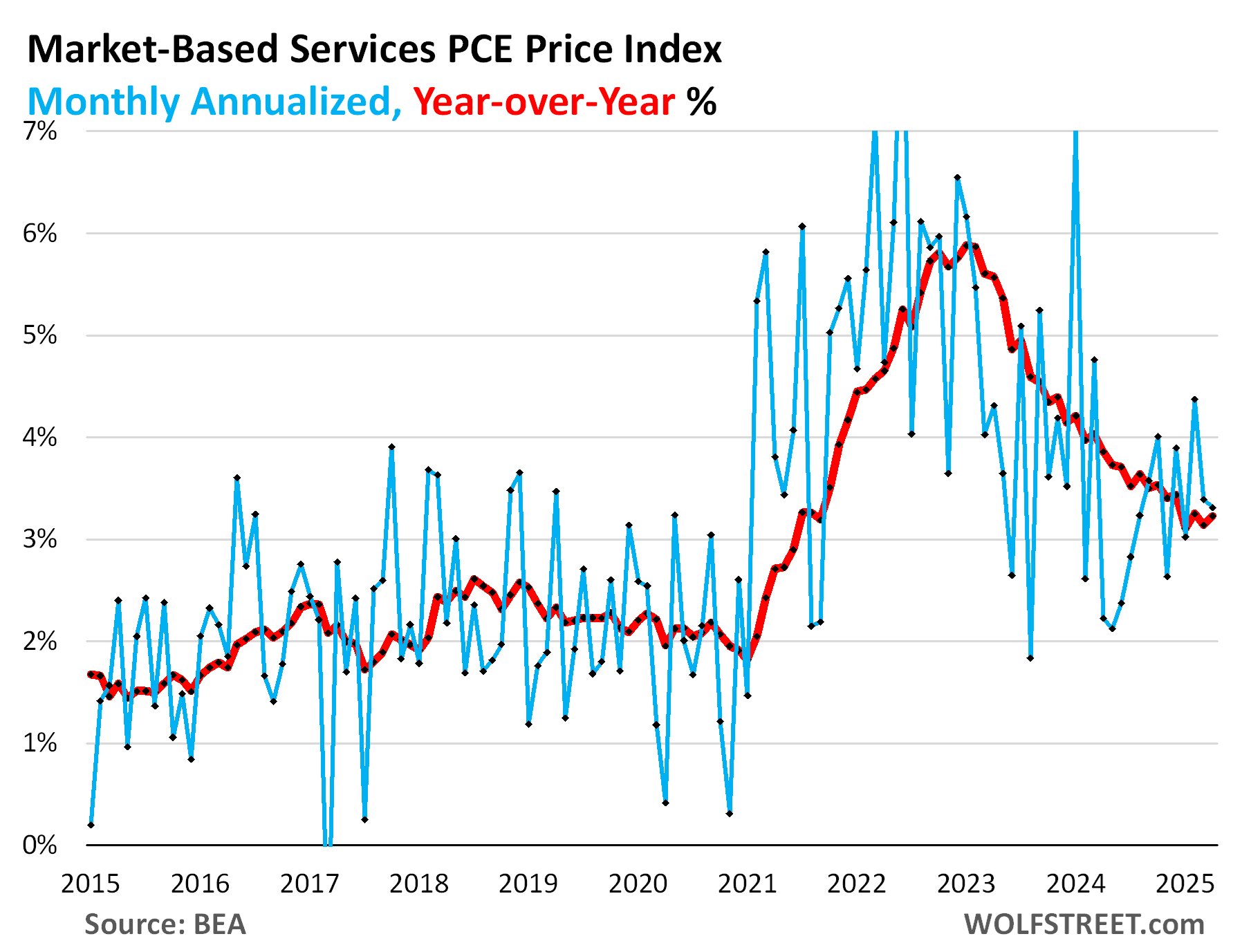
The market-based core PCE Price index rose by 3.1% annualized, a sharp acceleration. The six-month index accelerated to 2.5% annualized. And the year-over-year increase remained at 2.3%, roughly where it has been for the past four months:
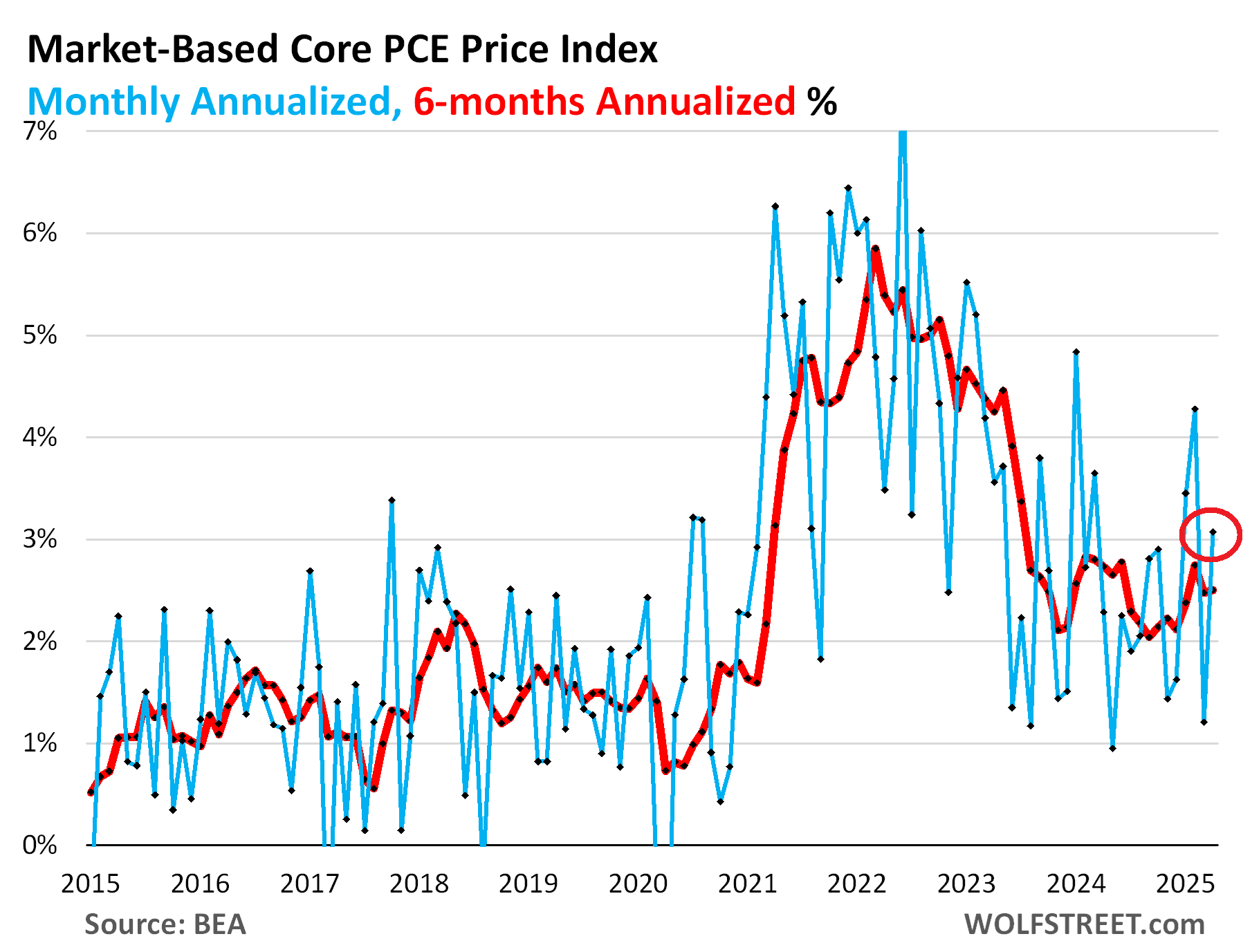
The snap-back cometh. Whatever inflation will do over the next couple of months, one thing we know: the PCE price index measures will include a snap-back from the plunge of the Financial Services index and the Recreation index.
The Fed knows all this, obviously, and Powell occasionally mentioned the Financial Services component when it acted up in one or the other direction, and at the June FOMC meeting he might mention both, the plunge of the Financial Services index and the historic cliff-dive of the Recreation index, and might add a word or two about the coming snap-back of them.
Enjoy reading WOLF STREET and want to support it? You can donate. I appreciate it immensely. Click on the mug to find out how:
![]()
The post How Financial Services, a Market Plunge in April, and a Historic Cliff-Dive by Recreation Services Messed with PCE Inflation Today. But a Snap-Back Cometh appeared first on Energy News Beat.
“}]] 

